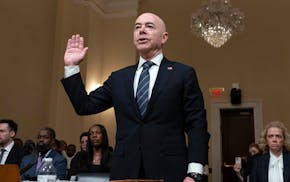Despite intense lobbying from religious leaders and community activists, the Minnesota House on Monday failed to override a veto of legislation that would have restored a state health care program for some of the state's poorest and sickest residents.
The DFL-controlled House lurched toward the vote even after Republicans vowed to uphold Gov. Tim Pawlenty's veto of a plan that would have resurrected General Assistance Medical Care (GAMC) before it expires April 1.
The state now will forge ahead with plans to transfer 32,000 people from the program to MinnesotaCare, a subsidized insurance program that requires participants to jump through more hoops and offers less coverage. Pawlenty and legislators are scheduled to return to the bargaining table Tuesday morning to see if there's a better option for GAMC, whose enrollees include many who are homeless, veterans or who suffer from addiction and mental illness.
"This wasn't a vote for an override; it was a vote to continue the negotiations," said House Minority Leader Kurt Zellers, R-Maple Grove.
DFLers said they were pushed into an uncertain vote by the governor's refusal to slow transfer from GAMC to a program they say many may not be able to cope with.
The fight could enter the courtroom as House Speaker Margaret Anderson Kelliher and other DFL leaders hinted that a legal challenge from groups representing the poor was imminent.
Kelliher did not identify who would mount the fight but said, "I would not be surprised if someone in the next 24 hours files something to create an injunction to stop the 'auto enrollment' from going forward." MinnesotaCare was designed as a program for lower-income working families, sustained by paid premiums and a tax paid on provider visits.
Politics of changed votes
House DFLers needed three Republicans to reach the 90-vote supermajority that could undo Pawlenty's veto. They got none, though 38 Republicans recently had voted to save the program. Two hours of debate -- in which legislators questioned one another's faith and commitment to veterans -- ended with a party-line 86-47 vote.
With signs the override would fail, House Majority Leader Tony Sertich, DFL-Chisholm, switched his vote, a technical move to allow him to bring up the bill later.
The debate started last summer, when Pawlenty stunned DFLers by ending funding for GAMC to help erase a multibillion-dollar deficit. Legislators searched for ways to resurrect the program, which covers single adults who earn less than $8,000 a year.
Less than two weeks ago, both houses approved legislation to extend the program for 16 months. Pawlenty vetoed it, calling it "irresponsible spending" in the face of a projected $1.2 billion shortfall. Last week, the Senate overwhelmingly voted to override the veto.
House Republicans who initially voted for the GAMC legislation and then to sustain the veto spent much of the day explaining their decisions.
"We do lots of votes like that," said Rep. Mary Kiffmeyer, R-Big Lake, in explaining her original vote, which she said was supposed to send the bill to a House and Senate conference committee. Kiffmeyer said she would not have voted for the legislation if she thought it was the last say she'd have on the bill. She voted Monday to sustain the veto.
Rep. Joyce Peppin, R-Rogers, said that she had told local hospital officials, who favor the legislation, that the priority was to find a long-term solution to the program's problems. "I don't think that they liked the bill all that much, but it's more like ... the cup is half full," she said.
After the vote, Pawlenty met with Republican House members to thank them for defending his veto. He invited top legislators to his office Tuesday morning to continue negotiations.
House DFL leaders said they were pessimistic about any breakthrough soon. While DFLers acknowledged House Republicans had offered some initiatives, they said Pawlenty's refusal to compromise made an agreement unlikely.
"Today was our last, best chance," said Rep. Erin Murphy, DFL-St. Paul, a key GAMC negotiator.
Intense public pressure
Legislators faced intense lobbying. Catholic bishops issued a letter to leaders in the church urging them to express support for the override. The Minnesota Hospital Association outlined the money hospitals stand to lose if GAMC goes away. Other religious and health organizations stressed that legislators had a moral obligation to ensure the state's poorest residents are cared for.
"I think this is a very mean-spirited and unethical action by the governor," said Linda Hamilton, president of the Minnesota Nurses Association.
Outside the House chamber, roughly 200 people -- many praying loudly -- urged legislators to preserve GAMC.
GAMC advocates, at a news conference, put forward victims who have counted on the program.
The Rev. Grant Stevensen of St. Matthew's Lutheran Church in St. Paul took aim at the governor. "Governor, please stop talking to us about God," he said, referring to Pawlenty's recent political speeches, in which he says that "God's in charge."
Said Stevenson on Monday: "Don't pass this off on God. That's no God we've ever heard of, and please stop lecturing us about God. It's offensive. The only God that we're aware of is the one who says, 'If you want to follow me, you will look out for the widows and orphans.'"
Baird Helgeson • 651-222-1288 Mike Kaszuba • 651-222-1673
New Black congressional district in Louisiana bows to politics, not race, backers say
Trump trial jury selection process follows a familiar pattern with an unpredictable outcome
Climate change concerns grow, but few think Biden's climate law will help, AP-NORC poll finds
